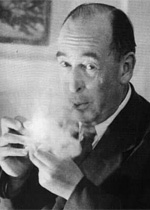The Unconsenting Skies
 Here’s a followup of sorts to our first piece of C.S. Lewis verse, written “against too many writers of science fiction.” Despite being a rather successful science fiction writer himself, Lewis had a dark view of supposed scientific progress in general, as is clear from this pessimistic look into the future of space travel. Fans of Lewis’ more religiously-minded literature might be surprised at his frank imagery, but he wasn’t as shy about certain things as his readers. As with the previous installment, this bit of verse is available in his Poems collection.
Here’s a followup of sorts to our first piece of C.S. Lewis verse, written “against too many writers of science fiction.” Despite being a rather successful science fiction writer himself, Lewis had a dark view of supposed scientific progress in general, as is clear from this pessimistic look into the future of space travel. Fans of Lewis’ more religiously-minded literature might be surprised at his frank imagery, but he wasn’t as shy about certain things as his readers. As with the previous installment, this bit of verse is available in his Poems collection.
Prelude to Space
An EpithalamiumSo Man, grown vigorous now,
Holds himself ripe to breed,
Daily devises how
To ejaculate his seed
And boldly fertilize
The black womb of the unconsenting skies.Some now alive expect
(I am told) to see the large,
Steel member grow erect,
Turgid with the fierce charge
Of our whole planet’s skill,
Courage, wealth, knowledge, concentrated will;Straining with lust to stamp
Our likeness on the abyss—
Bombs, gallows, Belsen camp,
Pox, polio, Thais’ kiss
Or Judas’, Moloch’s fires
And Torquemada’s (sons resemble sires).Shall we, when the grim shape
Roars upward, dance and sing?
Yes: if we honour rape,
If we take pride to fling
So bountifully on space
The sperm of our long woes, our large disgrace.



















 Full Details
Full Details


3 Comments
It’s a pretty damning condemnation of what the rest of us see a peaceful desire urge to explore. Perhaps, for Lewis, the mystery of the heavens is enough, but the next step to wonder is to discover, is it not? I’d be curious to hear Lewis’ alternative.
Wow, never seed that side of him. Loved it!
Lewis, being classically minded, would probably say that wonder follow on the heels of discovery, rather than the other way around. But he doesn’t see space travel as an act of discovery so much as an act of domination, and his traditional Anglican belief in man’s inborn wickedness certainly gives him pause about the effects of human expansion outside of our tiny globe. In fact, he suggests in his Cosmic Trilogy that the great distances between planets and solar systems act as a kind of quarantine to protect the universe from man.
Sorry, the comment form is closed at this time.